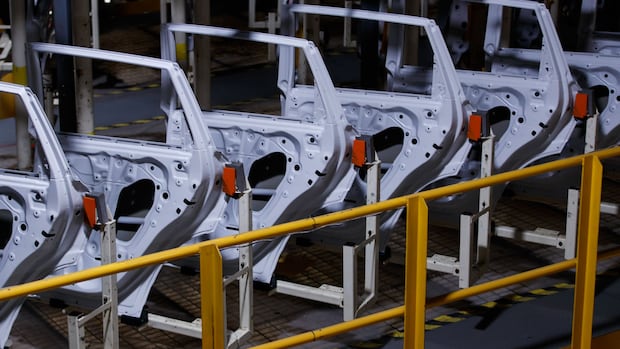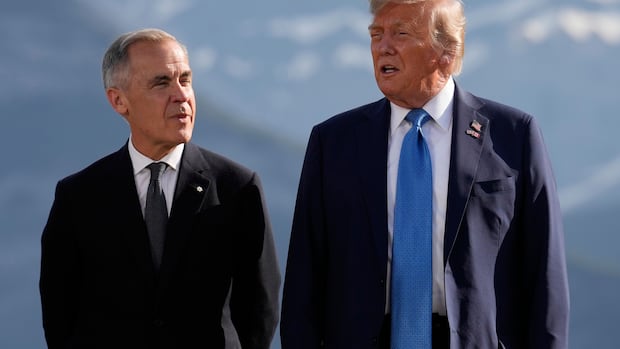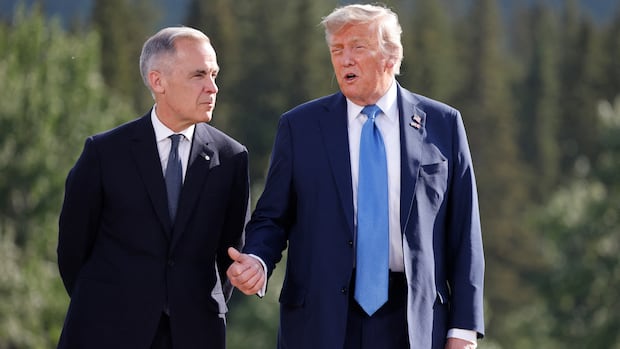It's down to the wire on U.S. President Donald Trump's threat to raise his tariff on Canadian goods entering the United States to 35 per cent, up from the 25 per cent rate that he imposed soon after taking office.
Trump set Aug. 1 as the deadline for Canada to reach a trade deal or face the tariff increase.
Here's a brief timeline of the key tariffs on Canada.
Feb. 1
Trump signs an executive order levying tariffs on Canadian exports to the U.S. at 25 per cent on all products, except energy, critical minerals and potash, which are hit with a rate of 10 per cent. The order justifies the tariffs as a way to "address the flow of illicit drugs across our northern border," citing fentanyl as a threat to national security. Trump later announces the tariffs will take effect March 4.
WATCH | What a trade war with the U.S. would mean for Canada:What would a Canada-U.S. tariff war actually look like? | About That
March 6
Just two days after Trump's tariffs on Canada come into force, Trump amends his executive order, giving an exemption for products that comply with the terms of the Canada-U.S.-Mexico Agreement (CUSMA). The exemption covers nearly 90 per cent of Canadian exports to the U.S., which means the vast bulk of products can cross the border tariff-free.
WATCH | What you need to know about Trump's tariffs on Canada:Trump's tariff war on Canada has finally begun | About That
April 29
After threatening to impose a 25 per cent tariff on automobiles and auto parts from outside the U.S., Trump waters down the levy, so it only applies to parts that aren't CUSMA-compliant and the non-U.S. portion of assembled vehicles. Still, the tariffs have an impact on Canada's auto sector and bite into the profits of North American automakers.
WATCH | Here's where things stand with Trump's auto tariffs:U.S. tariffs on auto parts take effect, CUSMA-compliant parts exempt
May 6
Prime Minister Mark Carney, just days after leading his Liberal Party to a minority election win, meets Trump at the White House. Carney presses Canada's case for the removal of tariffs, and while Trump speaks highly of his guest, the president gives no sign he's changing his mind on the issue.
WATCH | How Carney reacts to Trump's 'never say never' comments:Carney mouths 'never' several times responding to Trump's 51st state idea
June 3
Separately from the tariffs on Canadian goods, Trump doubles his tariff on steel and aluminum imports from all countries, to 50 per cent. Canada is the top supplier of both products to the U.S.
WATCH | How Canada's steel producers are reacting to Trump's latest tariff threat:Trump’s new tariff threat ‘punch in the gut’ to Canada's steel industry: CSPA
July 10
Trump threatens in a letter posted on his Truth Social platform to boost the tariff on Canadian goods to 35 per cent, effective Aug. 1. "If Canada works with me to stop the flow of Fentanyl, we will, perhaps, consider an adjustment to this letter," Trump writes.
WATCH | Here's what a deal by Trump's deadline could cost Canada:Trump’s tariff deadline: What a deal could cost Canada
July 11
Goods that comply with CUSMA will continue to be exempt from the tariff even if the rate rises on Aug. 1, according to a White House official.
WATCH | Why most Canadian exports still get into the U.S. tariff-free:CUSMA-compliant Canadian exports exempt from Trump's latest tariffs
July 25
One day after Canada's top negotiators downplay the prospects of getting a deal by Trump's deadline, the U.S. president also throws cold water on Canada's chances. "We haven't really had a lot of luck with Canada," he tells reporters at the White House. "I think Canada could be one [country] where there's just a tariff, not really a negotiation."
WATCH | 'We haven't really had a lot of luck with Canada,' Trump says:Trump on trade: 'I think Canada could be one where there's just a tariff'
July 30
Prime Minister Mark Carney says Canada's negotiating team is back in Washington for trade talks but gives his clearest indication yet that Canada might not land a deal by Trump's Aug. 1 deadline. Then shortly after midnight, Trump posted on his Truth Social platform, "Wow! Canada has just announced that it is backing statehood for Palestine. That will make it very hard for us to make a Trade Deal with them."
WATCH | As Trump's deadline nears, Carney says deal may not happen in time:Carney says 'we'll see' about a U.S. trade deal by deadline
















